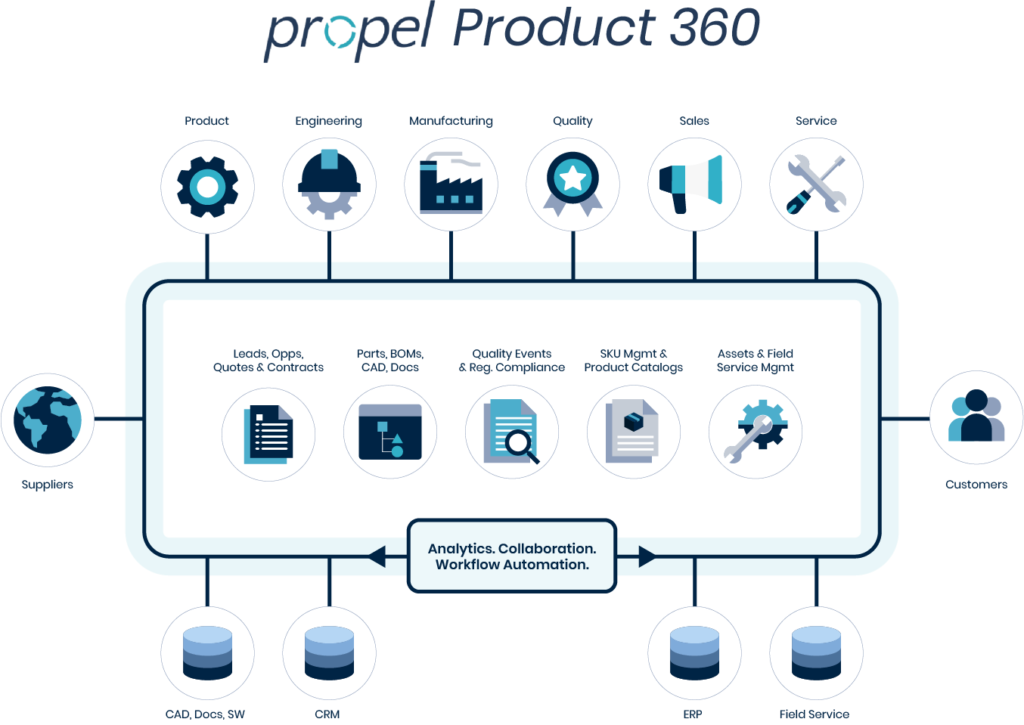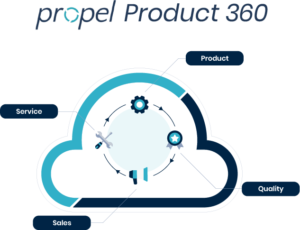
Digitization of the entire manufacturing value chain, from initial product concept through final delivery to the customer, has created an opportunity and need for a new generation of product lifecycle management (PLM) systems.
“Lingering deficiencies” in legacy PLM systems have seen them fail to deliver on their promise of product collaboration across the business, according to Ray Hein, co-founder and CEO, Propel. “Manufacturers need technology to help them collaborate broadly and respond to customer inputs as quickly as possible. Legacy PLM, which is primarily deployed on-premise  and confined to engineering, just doesn’t cut it anymore,” he says.
and confined to engineering, just doesn’t cut it anymore,” he says.
PLM software has historically been used by engineering teams to manage product-related data. But more and more manufacturers are finding it challenging to meet today’s needs with traditional PLM systems. Customers want faster quotes and higher quality, engineering teams want to get products to market faster, and finance teams want higher margins. Companies need PLM to extend well beyond engineering, which in turn has spawned a new generation of cloud-based solutions like Propel.
Automotive Industries (AI) asked Hein to tell us a little about Product 360, which he believes overcomes the problems faced by traditional PLM systems.
Hein: Propel’s Product 360 is the modern way for manufacturers to take products from concept to customer. Historically, manufacturers have relied on multiple, siloed solutions to create, commercialize and correct their products. This creates a lack of enterprise-wide collaboration, which in turn results in lost sales opportunities, longer time to market, higher costs, and a disjointed customer experience.
Propel offers a single solution for the entire enterprise rather than focusing on siloed PLM and quality management system (QMS) solutions used only by engineering or quality teams. The capabilities those engineering and quality teams require exist within Propel, but now they are fully connected to sales, marketing and service, as well as suppliers and customers themselves.
The result is enterprise-wide workflow automation, collaboration and business intelligence, which combine to increase responsiveness and agility. Our customers win more business because their quotes are created faster, with greater precision on delivery dates, and with complete cost accuracy.
customers win more business because their quotes are created faster, with greater precision on delivery dates, and with complete cost accuracy.
They increase customer satisfaction while reducing warranty cost by automatically connecting complaints to quality processes, resulting in faster root cause analysis and resolution. And their products get to market faster because everybody who contributes to product success can communicate and collaborate using the same solution and product data.
AI: What makes Propel different from other PLM tools in the marketplace?
Hein: A few things make Propel unique. The first is our Product 360 approach to product success. Propel includes all the capabilities of leading PLM, QMS and commercialization solutions in a single solution. So, in addition to each team having the capabilities they need to be successful, all product, quality and supplier data is available real-time and in one place. This enables enterprise-wide collaboration to ensure the right products are built and get to market as quickly as possible.
Second, we are 100% cloud native, which allows us to automate workflows and share real-time data with other systems, such as ERP, CRM, and field service, which helps ensure our customers can quickly make accurate decisions. The cloud also provides other benefits, such as quick deployments to minimize business disruptions, configurability to support unique business processes, and lower total cost of ownership.
Finally, Propel is built on Salesforce, ensuring our platform has the scalability, security and flexibility to meet the needs of companies of all sizes. The flexibility is key to many of our customers: some use Propel to replace entire systems, while others use Propel on top of legacy PLM or QMS systems that don’t support all their needs. We can do it all.
AI: Is the automotive industry a key strategic part of Propel’s growth over the next 5 – 10 years?
Hein: Tier 1 and Tier 2 automotive suppliers are a key part of our business. Propel is a great solution for this industry because we allow manufacturers t o bid on OEM requirements quickly and accurately. Once the business is won, integrated reporting and business intelligence provides real time visibility across the entire company. And we support multiple quality processes, such as APQP, PPAP and FMEA, allowing businesses to track, react and respond to product quality issues faster than legacy PLM and QMS providers. All while ramping production volume to meet OEM needs. In addition to the OEM wins, aftermarket replacement parts and service needs are supported through eCommerce solutions that link directly to Propel.
o bid on OEM requirements quickly and accurately. Once the business is won, integrated reporting and business intelligence provides real time visibility across the entire company. And we support multiple quality processes, such as APQP, PPAP and FMEA, allowing businesses to track, react and respond to product quality issues faster than legacy PLM and QMS providers. All while ramping production volume to meet OEM needs. In addition to the OEM wins, aftermarket replacement parts and service needs are supported through eCommerce solutions that link directly to Propel.
AI: What successes are Propel clients finding from using its technologies?
Hein: Here are few success stories from Propel customers:
- EMEA manufacturer increased engineering throughput by 500%
- North American manufacturer reduced design time from months to days
- APAC Automotive supplier improved margins 50%
- North America manufacturer reduced warranty costs by 30%
AI: What other innovations does Propel have coming through the pipeline?
Hein: Propel is committed to extending our lead in commercialization and supplier capabilities. Our 12-month roadmap includes capabilities in these two areas that will make it easier to efficiently collaborate with global suppliers and support omni-channel sales models.
About Ray Hein
Ray Hein is the CEO and co-founder of Propel, which helps companies achieve product success by connecting the people, systems and processes needed to deliver products from concept to customer. Based on years of experience building and leading product management teams in both SaaS software and hardware companies, Hein launched Propel in 2015 to disrupt a fragmented PLM process by harnessing all disparate elements into one flexible and easy-to-use platform that is the single source of product truth for the entire value chain.
Prior to founding Propel, Hein served as Senior Vice President of Product Management at Apttus, where he was responsible for product strategy and new product launches. He has also held senior leadership roles at Vendavo and Centric Software. Hein spent nearly a decade at Agile Software where he led product strategy and development and created the company’s product development roadmap, based upon his in-depth experience and knowledge of manufacturing. Hein was also responsible for the identification and acquisition of seven companies, ultimately resulting in Agile’s own acquisition by Oracle.
Hein is known as a results-driven leader, as well as a thought-leader within the analyst community. He has been awarded three patents covering product network effect and enterprise platform integration. Hein is Pragmatic Marketing certified, focusing on value propositions and prioritization to drive focused, market validated, product launches. Additionally, he is a Certified Agile scrum master.
About Propel
Propel enables Product 360, the modern way to take products from concept to customer. Born in the cloud and built on Salesforce, Propel helps manufacturers collaborate across the entire value chain to get the right products to market faster and at a higher margin. Companies of all types trust Propel to achieve product success, from hyper-growth startups like Desktop Metal, Imperative Care, and Inari Medical, to established innovators like Roku, Simplisafe, and Vizio, to Fortune 500 companies like Shell and Zoetis.









More Stories
Essential Features to Look for in ADAS Calibration Systems
Your Guide to Filing a Car Accident Claim
Steps to Take Immediately After a Car Accident